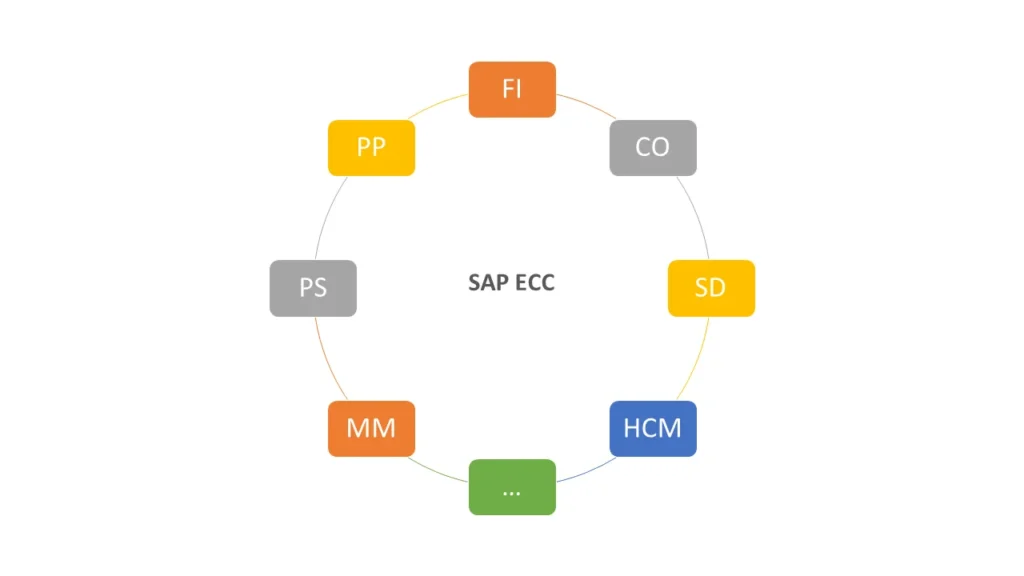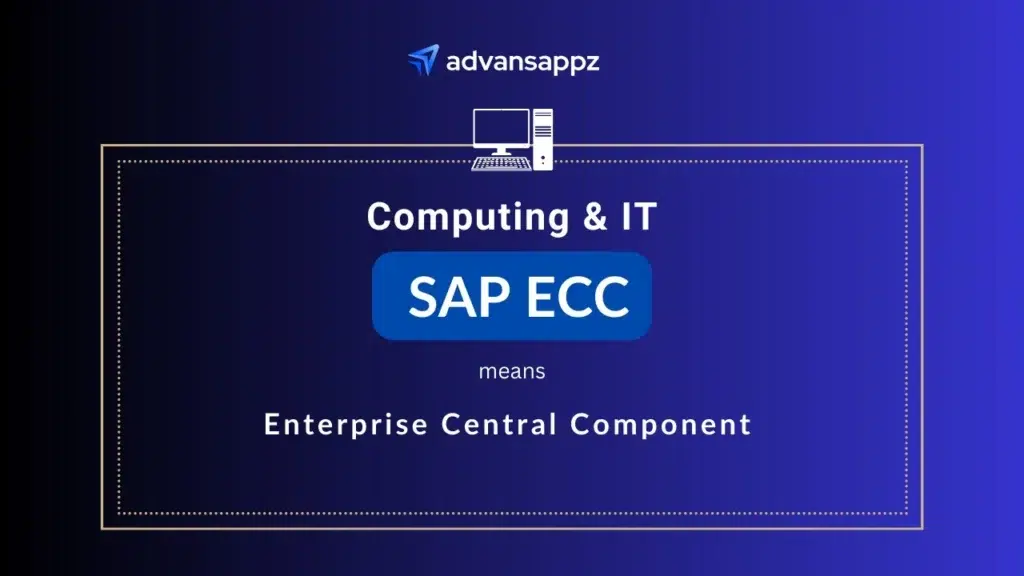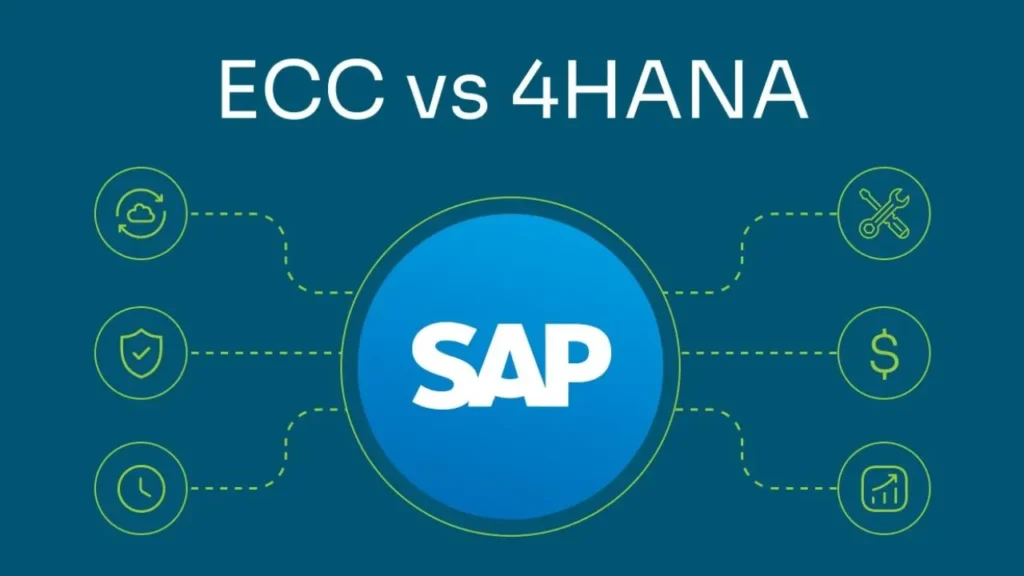Efficiency is the foundation of a competitive organization, not just a trendy phrase. SAP ECC, an integral part of many global businesses, is transforming how companies improve efficiency and optimize operations.
For those of you who don’t know, over 75% of the world’s transaction revenue goes through an SAP system. Companies like Coca-Cola, BMW, and Nestle rely on SAP ECC to manage their complex business processes.
This includes supply chain management, financial accounting, etc. Thus, this demonstrates the software’s capability to handle massive data and drive operational success.
As businesses face pressure to innovate and stay ahead, understanding the full potential of SAP ECC becomes crucial. In the following sections, we’ll explore SAP ECC meaning, how it benefits businesses, and what the future holds for this powerful software.
What is SAP ECC?

SAP ERP Central Component, is the core of SAP’s ERP system. Think of it as the command center where all the critical business processes come together. From managing finances and human resources to overseeing logistics and product planning, SAP ECC integrates these functions into one seamless system.
For example, imagine running a business with different departments all using their own software, it will be chaos, right?
SAP ECC eliminates this chaos by providing a unified platform i.e. a single platform for all departments. Moreover, it ensures that data flows smoothly across various departments. As a result, this makes it easier for businesses to operate efficiently and make informed decisions.
In short, it is about integration and efficiency. It’s designed to adapt to the unique needs of businesses, whether they’re in:
- Manufacturing,
- Retail, or
- Services.
Therefore, by centralizing operations and data, SAP ECC helps companies cut down on redundancies, reduce errors, and ultimately, boost productivity.
How Businesses Can Benefit from SAP ECC

Understanding the specific advantages can help businesses leverage this powerful software to its full potential. Let’s explore the key benefits that make SAP ECC software an essential tool for enterprises across various industries.
- Streamlined Operations and Improved Efficiency
SAP ECC centralizes business operations and makes sure that all departments work from the same data. This reduces redundancy and errors. Furthermore, by integrating various business functions into a single platform, companies can improve communication across departments, and streamline workflows.
For example, manufacturing plants can synchronize their production schedules with inventory levels to reduce waste and optimize resource utilization. This seamless integration allows for smoother workflows and faster response times to operational issues.
- Better Financial Management
With robust financial modules, it offers comprehensive tools for managing finances, from accounting to controlling. Furthermore, businesses gain real-time visibility into financial data, allowing for better:
- Budgeting,
- Forecasting, and
- Financial analysis.
This leads to more accurate financial reporting and improved fiscal management.
For example, in the finance sector, firms like PetroChina use SAP ECC to handle complex financial transactions. Moreover, it is also used to ensure compliance with regulations and generate accurate financial reports.
- Optimized Supply Chain Management
SAP ECC’s supply chain modules enable businesses to manage their supply chains efficiently. By optimizing procurement, production planning, and logistics, companies can reduce lead times, minimize costs, and enhance customer satisfaction.
As a result, this integrated approach ensures a more responsive supply chain.
For instance, retail giants like Walmart use SAP ERP Central Component to keep track of their inventory and optimize logistics.
- Better Human Resources Management
Managing a workforce is simpler with SAP ECC’s HR modules. The system handles everything from recruitment and onboarding to payroll and performance management. Thus, this centralized HR management improves employee data accuracy and supports strategic workforce planning.
For example, companies in the services industry, such as consulting firms, use SAP ECC to manage employee records, payroll, and recruitment processes.
- Improved Customer Relationship Management
SAP ECC also enhances customer relationship management by providing tools that help businesses understand customer needs and preferences. With integrated customer data, businesses can offer:
- Personalized services,
- Improve customer satisfaction, and
- Build stronger customer relationships.
For instance, in the retail industry, companies like H&M use the SAP ERP Central Component to track customer interactions, preferences, and feedback. Therefore, enabling personalized marketing and better customer service.
- Data-Driven Decision Making
By consolidating data from various business functions, SAP ECC provides powerful analytics and reporting tools. These tools enable businesses to make informed decisions based on real-time data and comprehensive insights. Moreover, improved reporting capabilities support strategic planning and performance monitoring.
For example, manufacturing companies like General Electric utilize this feature to analyze production data. Additionally, they use it to make informed strategic decisions that drive growth.
- Scalability and Flexibility
SAP ECC software is designed to grow your business. Whether you’re a small enterprise or a multinational corporation, it can scale to meet your needs. Moreover, the system’s flexible architecture allows for easy customization and integration with other software solutions.
For example, start-ups in the tech industry can begin with basic modules and expand their usage as they grow. As a result, this ensures that the system always supports their evolving requirements.
Difference between SAP ECC AND SAP S/4HANA

One question that often arises in discussions about SAP ECC and SAP S/4HANA is: Which is better for modern businesses? To answer this question effectively, let’s delve into the key differences between these two enterprise resource planning systems.
| Aspect | SAP ERP Central Component | SAP S/4HANA |
| Architecture | Traditional, based on SAP NetWeaver | Modern, based on SAP HANA |
| Database | Supports various databases like Oracle, DB2 | Exclusively runs on SAP HANA |
| User Interface | SAP GUI (Graphical User Interface) | Fiori UX (User Experience) |
| Analytics | Separate BW (Business Warehouse) for analytics | Embedded analytics capabilities |
| Customization | Highly customizable | Simplified, with fewer modifications required |
| Deployment Options | On-premises, hosted, or cloud deployment | SAP S/4HANA also comes with both a Cloud-first approach, and an on-premises option |
| Industry Solutions | Industry-specific solutions available | Streamlined, industry-specific solutions |
| Integration | May require middleware for integration | Improved integration capabilities, including APIs, but still require middleware |
| Licensing Model | Traditional licensing model | Subscription-based licensing model |
| Migration Effort | Significant migration efforts required | Simplified migration process, but still effortful |
Implementation Challenges of SAP ECC and Best Practices

Implementing SAP ERP Central Component can be a daunting task, presenting various challenges along the way. However, with strategic planning and the right partner, businesses can navigate these challenges effectively.
Implementation Challenges:
- Resource Allocation: Firstly, implementing SAP ECC demands substantial resources, including time, budget, and skilled personnel. Therefore, ensuring proper resource allocation and availability throughout the implementation phase is crucial.
- Change Management: Secondly, introducing a new ERP system often requires significant changes to existing business processes. As a result, overcoming resistance to change from employees and stakeholders can pose a considerable challenge.
- Data Migration: Moreover, migrating data from legacy systems to an ERP is complex. Maintaining data accuracy, integrity, and consistency during migration requires meticulous planning and execution.
- Integration: Additionally, integrating SAP ECC with existing systems and third-party applications requires seamless data exchange and interoperability. Achieving smooth integration without disrupting business operations can be challenging.
- Customization: Lastly, SAP ERP Central Component offers extensive customization options. However, excessive customization can lead to complexity and increased costs. Therefore, balancing customization with standardization is essential to ensure optimal system performance.
Best Practices:
- Thorough Planning: Firstly, begin the implementation process with a comprehensive assessment of business needs, goals, and challenges. Moreover, develop a detailed implementation plan that outlines objectives, timelines, and resource requirements.
- Engage Stakeholders: Secondly, involve key stakeholders, including employees, managers, and department heads, throughout the implementation process. Include open communication, address concerns, and provide training and support.
- Data Cleansing and Migration: Additionally, prioritize data cleansing and validation to ensure data accuracy and integrity before migration. Develop a data migration strategy that includes data mapping, extraction, transformation, and loading.
- Change Management: Implement a robust change management strategy to prepare employees for the transition. In short, provide training, support, and clear communication to mitigate resistance to change and promote user adoption.
- Select the right partner: Lastly, selecting the right partner for SAP ECC implementation is crucial, it secures expertise, support, and guidance tailored to your business needs. Therefore, with a trusted partner like advansappz, businesses can leverage specialized knowledge and experience to navigate challenges effectively. Let’s look at how advansappz helps businesses with implementation.
How advansappz can help in SAP ECC implementation
Leveraging the expertise of advansappz, an experienced IT company specializing in SAP implementation, can significantly enhance the success of your implementation.
advansappz offers comprehensive implementation services, including:
- Project management,
- System configuration,
- Customization,
- Training, and
- Support.
With advansappz’s help, your business can overcome implementation challenges effectively and unlock the full potential of SAP ECC. From streamlined processes to enhanced efficiency and productivity, partnering with advansappz makes sure that your business will skyrocket.
Future of SAP ECC: Innovation and Evolution

As we look ahead, the future of SAP ECC is one filled with promise and opportunity. While there’s been significant discussion around migrating to SAP S/4HANA, it’s essential to recognize that SAP ECC continues to evolve to meet the changing needs. Here’s why the future of SAP ERP Central Component remains bright:
- Continued Support and Updates:
Firstly, SAP remains committed to supporting ECC software for the foreseeable future. As a result, this ensures that businesses can continue to rely on the platform for their critical operations. Moreover, regular updates and patches will address security vulnerabilities, and meet regulatory requirements.
- Functionality and Features:
ECC continues to receive enhancements and new features that improve usability, performance, and scalability. As a result, these updates empower businesses to optimize their processes further. Moreover, it helps to adapt to changing market dynamics without the need for immediate migration.
- Integration with Innovative Technologies:
SAP ECC is compatible with a wide range of innovative technologies, including artificial intelligence, machine learning, and the Internet of Things (IoT). Therefore, by leveraging these technologies, businesses can unlock new insights and automate processes.
- Seamless Transition Pathways:
SAP provides clear roadmap options and transition pathways for businesses hesitant to migrate to SAP S/4HANA immediately. As a result, this phased approach allows organizations to gradually adopt new technologies and functionalities. Thus, this ensures a smooth transition when the time is right.
- Ecosystem of Partners and Support:
Lastly, with a vast ecosystem of partners, and developers specializing in ECC, businesses have access to a wealth of expertise and support. Furthermore, partners like advansappz offer tailored solutions, industry-specific knowledge, and ongoing assistance to help organizations maximize the value of their SAP investment.
Conclusion
In simple terms, SAP ECC is here to stay and offers plenty of benefits for businesses. With ongoing updates and support, it keeps getting better. Moreover, integration with cutting-edge technologies ensures that ECC continues to be a cornerstone of enterprise success.
Therefore, by tapping into its features and working with partners like advansappz, businesses can boost efficiency and grow.
So, ready to explore the possibilities?
Connect with advansappz today and see how SAP ECC can transform your business journey.
FAQS about SAP ECC
- Are SAP ECC and SAP ERP the same?
SAP Enterprise Central Component is a part of SAP ERP (Enterprise Resource Planning). So, while ECC is a specific version of SAP ERP, they’re not the same.
- Who uses SAP ECC?
Many big companies across different industries use SAP ECC for managing their business operations. Basically, any business that needs to keep track of things like finances, inventory, and customers can benefit from the SAP Enterprise Central Component.
- Are ECC and Hana same?
No, ECC and HANA are different. ECC is the software that manages business processes, while HANA is a type of database technology that can be used with SAP ECC. So, they work together but serve different purposes.
- Can SAP ECC run on HANA?
Yes, ECC can run on different databases like Oracle, Microsoft SQL Server, and IBM DB2, not just HANA. Additionally, companies can choose the database that best fits their needs and infrastructure.
- What are the limitations of SAP ECC?
While SAP ECC is powerful, it does have some limitations. For example, it may not always be easy to customize to fit specific business needs. Additionally, it can also be complex to implement and maintain. However, these challenges can easily be taken care of by partnering with advansappz.












